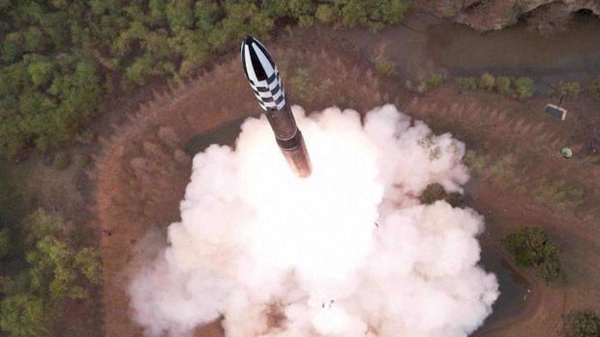image1
A view of a test launch of North Korea’s solid-fuel intercontinental ballistic missile (ICBM) Hwasong-18 at an undisclosed location on April 14, 2023.
South Korea says the North has test-fired its most advanced intercontinental ballistic missile (ICBM), theoretically capable of reaching anywhere in the United States.
According to officials in South Korea and Japan, Pyongyang launched two missiles-one short-range- in the 24 hours leading up to Monday morning.
"The ICBM-class ballistic missile launched this time, if calculated based on the trajectory, depending on the weight of warhead, could have a flying range of over 15,000km [9,320 miles]," said Japan’s Shingo Miyake, the parliamentary vice minister of defense.
The short-range missile was launched from the Pyongyang area towards the waters between the Korean Peninsula and Japan, with the test taking place at about 10:38pm, according to South Korea.
The projectile flew for about 570 kilometers before falling into the sea northwest of Tokyo.
Jeffrey Lewis, a professor at the James Martin Center for Nonproliferation Studies at the Middlebury Institute of International Studies, told CNN that the test was likely the third of the Hwasong-18 missile, a powerful solid-fueled ICBM North Korea also launched in April and July.
He said it shows a maturing North Korean missile program.
"If this is indeed the third successful flight test in a row, that would be a good record of reliability."
The country’s leader Kim Jong-Un said after the April test that the ICBM would provide the country with a "powerful strategic attack means" and boost its nuclear capabilities.
North Korea also tested the liquid-fueled Hwasong-17 ICBM back in March.
But the Hwasong-18, which is solid-fueled, is more stable, and can be moved more easily to avoid detection before a launch that can be initiated in a matter of minutes, according to experts.
They say Pyongyang’s advancement from the Hwasong-17 last year to the Hwasong-18 this year suggests its missile program is making progress.
North Korea has not confirmed details of Monday’s launches, but the country’s state media KCNA published a statement by the country’s Defense Ministry spokesperson shortly after the report by Seoul, condemning what they called "reckless military provocations" by the US and South Korea.
The spokesperson also cited the arrival of the US attack submarine USS Missouri in South Korea last week, saying that Washington has "hatched a dangerous plot for a nuclear war."
Pyongyang has previously warned that the US is increasing provocations of a "nuclear war" by deploying nuclear-capable bombers to the region. It said that US nuclear assets stationed in the Korean peninsula will become Pyongyang’s "first targets for destruction" in the event of an actual conflict.
The United Nations Security Council has adopted many resolutions calling on North Korea to halt its nuclear and ballistic missile programs since it first conducted a nuclear test in 2006. The country has been under harsh sanctions by the United States and the United Nations Security Council for years.
But the North last year declared itself an "irreversible" nuclear power and has repeatedly said it will never give up its nuclear program, which it says is defensive.











